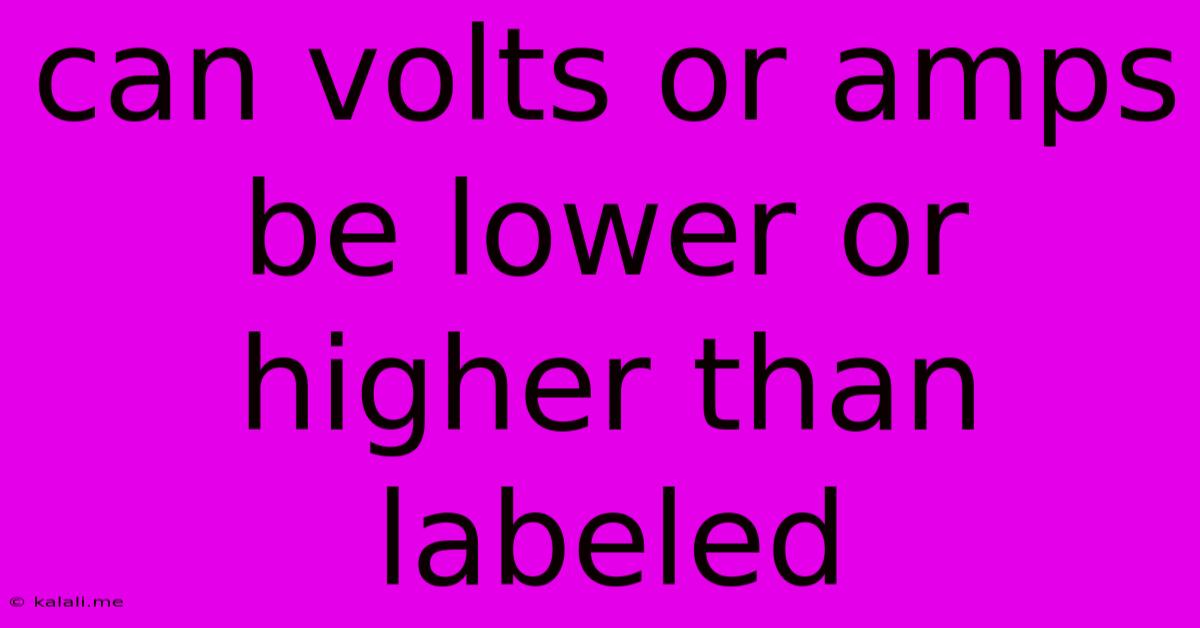Can Volts Or Amps Be Lower Or Higher Than Labeled
Kalali
Jun 01, 2025 · 3 min read

Table of Contents
Can Volts or Amps Be Lower or Higher Than Labeled? Understanding Voltage and Current Fluctuations
Understanding the voltage and amperage ratings on your electrical devices is crucial for safe and efficient operation. But what happens when the actual voltage or amperage differs from the label? This article explores the implications of voltage and current fluctuations, explaining why they occur and what the consequences might be.
What Do Volts and Amps Represent?
Before diving into fluctuations, let's clarify what volts and amps represent:
-
Volts (V): Volts measure the electrical potential difference, essentially the "push" or force that drives electrons through a circuit. Think of it like water pressure in a pipe. Higher voltage means a stronger push.
-
Amps (A): Amps measure the electrical current, or the rate of electron flow. It's the actual amount of electricity flowing through the circuit. Think of it as the flow rate of water in a pipe. Higher amperage means more electricity flowing.
Voltage Fluctuations: Higher and Lower Than Labeled
Voltage fluctuations are relatively common, stemming from various sources, including:
-
Power Grid Issues: Problems within the electrical grid, such as surges, brownouts, or power outages, can cause temporary voltage spikes or drops.
-
Distance from Power Source: The further an appliance is from the power source, the more voltage can be lost through the wiring.
-
Faulty Wiring: Damaged or poorly installed wiring in your home can also lead to voltage fluctuations.
-
High Power Demand: When many high-power appliances are running simultaneously, it can overload the circuit, leading to voltage drops.
Consequences of Voltage Fluctuations:
-
Higher Voltage (Overvoltage): This can damage sensitive electronics by overloading components, potentially leading to malfunctions or complete failure. Surge protectors can mitigate this risk.
-
Lower Voltage (Undervoltage): This can cause appliances to underperform, run inefficiently, or even fail to start. It can also lead to overheating in some cases.
Amperage Fluctuations: Higher and Lower Than Labeled
Amperage fluctuations are usually less common and are often a consequence of voltage fluctuations or other issues.
-
Higher Amperage (Overcurrent): This is usually caused by a short circuit or an overloaded circuit. It can lead to overheating, fire hazards, and blown fuses or tripped circuit breakers—safety mechanisms designed to prevent damage.
-
Lower Amperage (Undercurrent): This is often less dangerous but can indicate a problem with the appliance itself, such as a malfunctioning motor or internal component.
What to Do If You Notice Fluctuations:
-
Check Your Wiring: Ensure your home's wiring is in good condition.
-
Use Surge Protectors: Protect sensitive electronics from voltage surges.
-
Monitor Your Power Consumption: Avoid overloading circuits by using high-power appliances strategically.
-
Contact an Electrician: If you experience persistent or significant voltage fluctuations, consult a qualified electrician to diagnose and address the underlying issue. This is particularly important if you suspect a problem with your home's electrical system.
Understanding the Importance of Ratings
The voltage and amperage ratings on your appliances are crucial safety and performance indicators. While minor fluctuations are often manageable, significant deviations can lead to damage or hazards. By understanding the causes and consequences of these fluctuations, you can take steps to ensure your appliances operate safely and efficiently. Regular maintenance and attention to your home's electrical system are key to preventing problems.
Latest Posts
Latest Posts
-
How To Enter Visual Block Mode In Vim
Jun 02, 2025
-
Comma Before Or After So That
Jun 02, 2025
-
Ffmpeg Rtp Copy Only 3 Frames
Jun 02, 2025
-
And So Now I M Just Wondering Whats Going To Have
Jun 02, 2025
-
Why Is My Led Light Flickering
Jun 02, 2025
Related Post
Thank you for visiting our website which covers about Can Volts Or Amps Be Lower Or Higher Than Labeled . We hope the information provided has been useful to you. Feel free to contact us if you have any questions or need further assistance. See you next time and don't miss to bookmark.